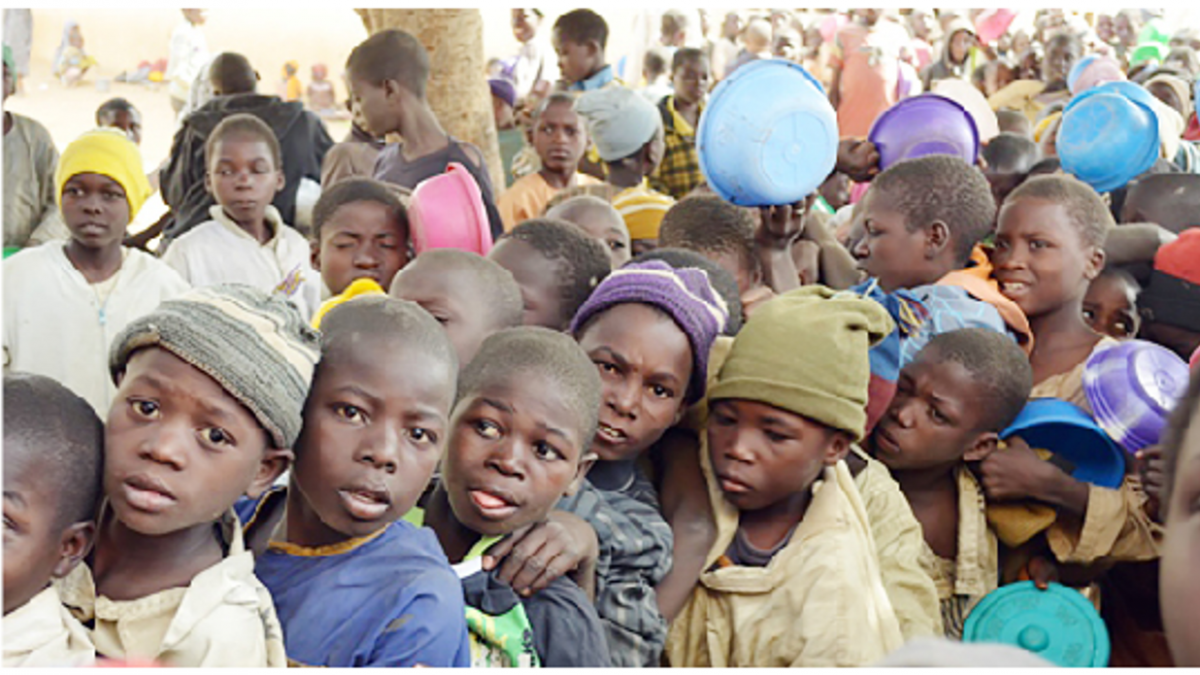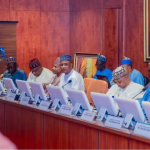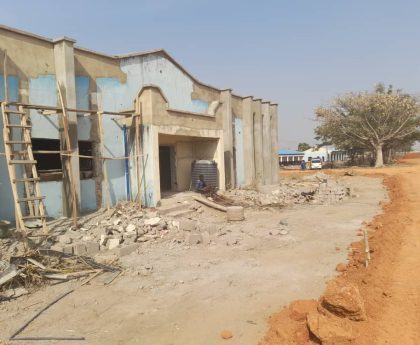The Almajiri constitute a greater part of the out-of-school children with no representation, no voice, no reputation in the society making them vulnerable as they are exposed to all the negative influence prevalent in our society.
The Sultan of Sokoto, Muhammad Sa’ad Abubakar II, while addressing the Northern Governors Forum at a meeting held in Kaduna recently, pleaded with the 19 governors of the Northern region to support the establishment of the Almajiri and Out-of-School Children Commission in the region and ensure its success.
Former Nigerian President, Olusegun Obasanjo, also speaking at an event in Bauchi recently said, 10% of the nation’s population who should be in school are not receiving any formal education, making them vulnerable to recruitment by extremist groups such as Boko Haram and bandits in the future.
The Almajiri constitute a greater part of the out-of-school children with no representation, no voice, no reputation in the society making them vulnerable as they are exposed to all the negative influence prevalent in the society.
His Eminence, the Sultan of Sokoto appeal, begging for the support of the establishment and success of the Almajiri and Out-of-School Children Commission in the North to finding a lasting solution to the growing number of children roaming the streets is a wake up call to recognize, respect and give these category of Nigerians a voice before they turn renegade.
Findings shows that the National Commission for Almajiri and Out-of-School Children Education (NCAOOSCE), a government parastatal, was established by an Act of Parliament on Children’s day, 27th May 2023 under the direct supervision of the Ministry of Education with the objective of giving quality learning to every child irrespective of their circumstances.
However, most state government already have agencies handling Almajiri and Out-of-School Children issues, therefore, the apathy demonstrated by states towards the support for this commission is to avoid duplicating responsibilities for agencies.
The truth is that agencies responsible for Almajiri and Out-of-School Children in most states since their inception have made very little or no impact at all on the Almajiri and Out-of-School Children situation because the number kept on growing, signalling doom for the society according to Chief Olusegun Obasanjo’s opinion. Moreover, most of these agencies have no definitive approach to curb the menace of children roaming the streets in many communities across the northern states.
Former President Goodluck Jonathan established Almajiris schools which did not see the light of the day because many people sees it as a discriminatory approach in the sense that when Almajiri attends school like every other child but he is said to have attended Almajiri school. That makes the child’s education inferior to other children who went through the same educational process studying same things but in different schools.
Kenneth T. Azaigba, of the Department of History and Strategic Studies, Federal University Dutsin-Ma, Katsina State, in his journal, The Goodluck Jonathan Almajiri Schools Initiative in
Nigeria: Examining the Cause Célèbre, explained, “Goodluck Jonathan administration in a bid to get these children into schools and curb the social malfeasance associated with this demographic group initiated the Almajiri schools programme. However, the programme has since been criticized and abandoned even after committing colossal State resources in building the schools.
He proceeded to prove that “the programme was not well thought-through and was poorly implemented due to deliberate sabotage by some stakeholders”. He therefore, “concludes that the Goodluck Johnathan Almajiri schools initiative was a top to down intervention. It ended as a futile attempt by the Federal government to resolve a problem that had local tap roots”.
Kenneth T. Azaigba further explained that, “The Almajiri problem is a puzzling national question. The complexity of the quandary is due essentially to the cultural and religious basis of the system. Religious issues are often sensitive and fragile. Resolving issues with religious links through secular approaches usually pose enormous challenges. This is because the sentiments that are constructed around theological questions tend to undermine attempts at altering the status quo. There is a near consensus on the fact that the Almajiri system is generating contradictions inimical to national security and indeed human capital development. But how to confront the ills of the system has remained controversial due to the divergent views that have been proffered as remedies”.
Kenneth T. Azaigba explanations shows reasons why efforts by the government has not yielded positive results just like the case of the nomadic education for nomads established in 1989 by defunct Decree 41 now Nomadic Education Act, Cap N20 Laws of the Federation of Nigeria (LFN) 2004, to cater for the educational needs of the
socially excluded, educationally disadvantaged and migrant groups in Nigeria which had been affected by defective policy, inadequate finance, faulty school placement, incessant migration of students, unreliable and obsolete data, and cultural and religious taboos.
Almajiris are male children who leave their homes to study Islam and the Qur’an in a Qur’anic school, or Tsangaya, in northern Nigeria. It can be equated to the way many people travel abroad to acquire western education. Therefore, talking of giving education to Almajiris is an aberration because they left home to get Islamic education where they reside so minimizing their pursuit to just adventure and not education is somehow out of point, rather, we should be talking of adding value to their education by seeking ways to mitigating the ills inimical in the system of education by integrating it with the formal education system to make their pursuit valuable.
The term “Almajiri” comes from the Arabic word Al-muhajir, which means “migrants”, they migrated to get educated in a way, just that the kind of education is not for the acquisition of knowledge that will get them employed in the commercial world but for the knowledge that will give them the understanding of the spiritual environment to help them live by it and share with others or teach others.
The Almajiranci system encourages parents to leave parental responsibilities to the Islamic school between the ages of 4 to 12. Although, many Almajiris come from poor families who can’t afford formal education but even children from reputable homes sometimes join them in the expedition of the Tsangaya and the daily struggle of roaming around to play, beg before returning to the Tsangaya to continue their studies.
Almajiris are often forced by their teachers to beg in the streets to fund their education at the Tsangaya because the teachers have no government support to cater for all the needs of the Tsangaya not to talk of helping the children to enroll in a school for formal or western education.
There are many well to do people today who went through the Almajiri education system but were fortunate to get informed about the need for formal education and means of acquiring the formal education which gave them the privilege of having both.
Two friends, one currently working in an institution of higher learning, the other a superior officer with a renown Non Governmental Organization in Katsina, share their experiences in the Tsangaya. They both affirmed that it was an exciting one for them but during their struggles as Almajiris, they were lucky to have got commercial bus drivers who recruited them as motor boys at some point in their life which afforded them the opportunity to raise little fund to finance their enrollment in formal education setting.
These are just few out of many who experienced first hand the Almajiranci system of education, including the begging to survive and the everyday struggle of children who unfortunately find themselves in situation beyond their control.
The solution to the Almajiri and Out-of-School Children situation lies in the voices of these sort of people who understands the Tsangaya, went through it out of necessity and came out without regret. They can speak to profer solutions to taking the Almajiris out of our streets to enjoy at least the Basic education which is the responsibility of the government.
Parents that sent their children to Tsangaya, the teachers that owns the Almajiri’s schools as well as the Almajiris must be enlightened as stakeholders in formulating a system that will allow the Almajiranci system of education to go along with the formal or western education despite the divergent views without making the Almajiri’s education system inferior to the formal education system so that the Almajiris can have a better future like every other Nigerians.
KatsinaMirror will be talking to stakeholders in the Almajiranci system of education and their voices will be published to form opinions that can remedy the growing number of Almajiri and Out-of-School Children who are begging, suffering and roaming the streets hopelessly in search of basic needs making them prone to ills everywhere.
femiores@katsinamirror.ng




